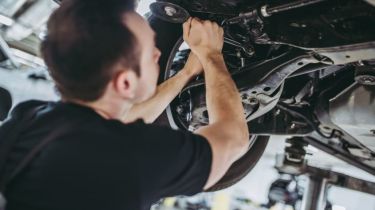Underseal: what is it and is it worth doing?
We answer the questions you may have about car underseal

There was a time when cars were very susceptible to rusting, with corrosion common within the first years of ownership. Luckily, nowadays this is much less likely to happen thanks to better rustproofing from manufacturers, but that doesn’t mean the threat has gone away completely, which is why many people choose to use underseal on their cars.
There are still cases of modern cars rusting, with many examples of the corrosion being hidden beneath bodywork or in locations that are difficult to see. If this is untreated, it could cause MOT failures and potentially give your car a one-way ticket to a scrapyard.
There are some car brands that are more likely to rust than others, and owners should pay particular attention to imported Japanese used models, as these aren't extensively rustproofed, due to a mild climate and the fact that roads there are not treated with salt during the winter.
For the most part, applying underseal or other rustproofing to your car can be a smart investment, potentially prolonging its life and preventing any unwanted bills in the future. It's particularly advised if you live in a coastal location, habitually drive on poor-quality roads or have already seen MOT advisories for corrosion on the car. Even if your car has already started rusting, acting now by remedying the problem or by using some underseals can help prevent the issue getting worse.
What is car underseal?
You may be wondering what underseal is, and the simple answer is that it’s a kind of tough paint created to protect the parts of the car you don’t see and are likely to come into contact with salt, water and stones, such as the wheelarches and underside. It’s thick and unattractive, but it can handle a lot more punishment than regular paint.
There is an underseal applied during the production of the car, but over time this can become damaged and less effective. Once that factory layer has broken down, salt and water will get beneath the coating and mud can get stuck behind trim, which would both inevitably lead to bigger issues.
There are some manufacturers that don’t apply as much underseal or rust protection to their cars due to the warm, mild climates in which they are based, so when you get a new car, it may be a good idea to get a new layer of underseal applied to provide that extra reassurance that your car is completely protected.
If rust is left unchecked and begins to spread, this can lead to massive bills that make the vehicle not worth repairing when compared to its value. Small patched welds can be enough to get the car through an MOT, but only replacing a panel completely will guarantee it won't return.
Can you apply underseal to an electric car?
Yes, you can apply underseal to an electric car, but extra care is essential. Electric vehicles have high-voltage batteries, wiring and other sensitive electrical components that can be easily damaged if exposed to underseal products. Applying underseal directly to these parts could lead to electrical issues or even void your warranty.
Before starting, it’s crucial to identify and carefully wrap or shield all key electrical areas, such as the battery pack and wiring. Once these parts are protected, you can proceed with applying underseal to the rest of the car’s underside. It’s also a good idea to avoid water-based underseal products, as moisture can potentially interact with the electrical systems.
If you’re unsure about doing this yourself, it’s best to consult a professional. There are specialist companies with experience in undersealing electric cars, who know the specific areas to avoid and how to ensure long-lasting protection without compromising your vehicle's safety.
Car underseal options
There are several types of car underseal treatments, each offering different levels of protection. The most affordable option is bitumen-based underseal, a material often used in road surfacing. Priced at around £5 for a small container, it’s a budget-friendly choice for older or low-value cars that might not be on the road for much longer.
However, bitumen doesn’t have the best appearance and can be difficult to remove once applied, so it’s important to tape off any areas you don’t want covered. Gloves and a mask are essential during application due to the strong fumes. While a thick coat of bitumen can protect the underside of your car for a few years, it will eventually break down and start to crack.
A more durable option is wax-based underseal. Although pricier, it has the benefit of ‘self-healing’, meaning if a stone or debris chips the surface, the wax can flow back and reseal the area, maintaining its protective properties. However, like bitumen, wax-based treatments will wear off after a few years, and frequent pressure-washing of the car’s underside can speed up this process.
At the top end are advanced underseal treatments that incorporate rust converters and corrosion inhibitors. These not only provide a robust protective barrier, but can also treat existing rust, making them ideal for cars already showing signs of corrosion. This type of underseal is a worthwhile investment if you’re looking to extend the life of your vehicle and keep rust at bay for the long term.




